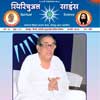
Which is better- Sannyas or Nishkam Karm Yog ?
April 9, 1988
Gurudev Shri Ramlal ji Siyag
Founder and Patron of AVSK, Jodhpur
In the first verse of the fifth chapter of Bhagvad Geeta, Arjun asked Bhagwan Shri Krishna:
-
Shree Krishna, You praised the path of renunciation of actions (karm sannyas), and You also advised to work in devotion (karm yog). Please tell me decisively which of the two is more beneficial?
(Bhagavad Geeta 5:1)
To which Bhagwan Shri Krishna replied
-
Both, the path of karm sannyās (renunciation of actions) and karm yog (working in devotion) lead to the supreme goal. But, of the two, working with devotion is better than renunciation of work.
(Bhagavad Geeta 5:2) -
One who neither desires nor hates anything is known to be always renounced. Such a person, free from all dualities, easily overcomes material bondage and is completely liberated, O mighty-armed Arjuna.
(Bhagavad Geeta 5:3) -
Only the ignorant speak of renunciation of actions and working in devotion as different. Those who are truly learned say that he, who applies himself well to any one of these paths, achieves the results of both.
(Bhagavad Geeta 5:4) -
The supreme state that is attained by means of renunciation of actions (karm sannyas) is also attained by working in devotion (karm yog). Hence, those who see karm sannyās and karm yog to be identical, truly see things as they are.
(Bhagavad Geeta 5:5) -
Perfect renunciation (karm sannyās) is difficult to attain without performing work in devotion (karm yog), O mighty-armed Arjun, but the sage who is adept in karm yog quickly attains the Supreme.
(Bhagavad Geeta 5:6) -
The karm yogis, who are of purified intellect, and who control mind and senses, see God in every living being. Though performing all kinds of actions, they are never entangled.
(Bhagavad Geeta 5:7) -
Those steadfast in this karm yog, always think, “I am not the doer,” even while engaged in seeing, hearing, touching, smelling, moving, sleeping, breathing, speaking, excreting, and grasping, and opening or closing the eyes. With the light of divine knowledge, they see that it is only the material senses that are moving amongst their objects.
(Bhagavad Geeta 5:8-9) -
One who performs his duty without attachment, surrendering the results unto the Supreme Lord, is unaffected by sinful actions, as the lotus leaf is untouched by water.
(Bhagavad Geeta 5:10) -
Offering the results of all activities to God, the karm yogis attain everlasting peace. Whereas those who, being impelled by their desires work with a selfish motive become entangled because they are attached to the fruits of their actions.
(Bhagavad Geeta 5:12)
-
Bhagwan Shri Krishna has made it clear that by considering himself the doer, a man under the control of Maya (Illusory power of God) gets entangled in the cycle of birth and death, and suffers.
-
Even after listening to the discourses on the Bhagvad Geeta, the illusion of people hasn't gone away. The only reason is that the one who is giving the discourse is also under the illusion. This is the only reason that in the Hindu religion, one is repeatedly commanded to take refuge in the Guru. The voice of an enlightened Guru is effective and dispels darkness in a moment.



